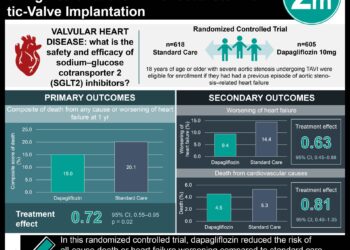Days alive out of hospital after ventricular assist device implantation vary with comorbidity status
1. This cohort study showed significant variability in days alive out of hospital (DAOH) within one year of ventricular assist device implantation.
2. Patients amongst the lowest tercile by percentage DAOH had longer hospital stays, less time at home and more time in nursing homes than those in higher terciles.
Level of Evidence Rating: 2 (Good)
Study Rundown: Left ventricular assist devices (VAD) can help manage advanced heart failure and related complications. Unfortunately, they remain associated with a high rate of device malfunction and other complications, which can lead to recurrent hospitalizations and reduced quality of life. Therefore, it is essential to consider patient-important outcomes in addition to morbidity and mortality data. Percent of days alive and out of hospital (DAOH) after VAD implantation is one such patient-important outcome. This study sought to determine whether the percent DAOH was associated with other clinical outcomes in patients within one year of VAD implantation.
3387 patients were included in this study from a total of 129 hospitals. At 1-year follow-up, 20.6% of patients had died, and 12.8% had received a heart transplant. The overall median %DAOH was 88.8% before implantation. Patients with a lower %DAOH were more likely to have spent time in a skilled nursing facility or hospital before VAD implantation. There was a weak, positive correlation between %DAOH before and after implantation and a negative correlation between %DAOH and length of index hospitalization at the time of implantation. The median %DAOH after implantation was 84.6%. Patients who died during the year of follow-up had a lower %DAOH than those who remained alive.
This study by Noly et al. demonstrated that %DAOH is highly variable in the year after VAD implantation and may be a factor in patients’ comorbidity status, amongst other things. The validity of %DAOH as a measure of health-related quality of life should be further studied, perhaps amongst a more specific subgroup of this study’s population. Limitations of this study include capturing limited data from Medicare beneficiaries only and being unable to account for potential confounding factors. However, this information contributes to understanding care patterns and complications following VAD implantation.
Click here to read this study in JAMA Surgery
Click to read an accompanying editorial in JAMA Surgery
In-Depth [retrospective cohort]: A retrospective cohort study using previously-collected data from the Society of Thoracic Surgeons and Medicare databases was performed. Eligible patients were Medicare beneficiaries aged 19 or older who underwent primary, continuous flow, left VAD implantation between 2012 and 2016 with at least one year of follow-up data available. Percent DAOH was calculated by subtracting the number of days spent in a healthcare facility from the total follow-up time. Health-related quality of life was assessed using the EuroQol questionnaire.
The median %DAOH was 88.8% before implantation across the total cohort, with an interquartile range of 82.7-93.8%. This corresponds to 160 (149-169) days. 80.8% of patients had at least one hospitalization, the median duration of which was 12 days. A weakly positive correlation between %DAOH before and after VAD implantation was demonstrated with a correlation coefficient of 0.06 (95% confidence interval 0.03-0.10). There was a negative correlation between %DAOH and length of stay at index hospitalization, with a correlation coefficient of -0.15 (0.21-0.09).
The median %DAOH after implantation was 84.6% (62.1-91.5%), and half of all patients spent more than 80% of their time at home during the year of follow-up. Patients who died were more likely to have a low median %DAOH (3%, 0-32%) than those who lived, having received a transplant (79%, 64-88%) or not (85%, 82-95%). Patients in the low %DAOH were often older, unmarried, had ischemic cardiomyopathy, a history of cardiac surgeries and required dialysis than those in higher terciles.
Image: PD
©2023 2 Minute Medicine, Inc. All rights reserved. No works may be reproduced without expressed written consent from 2 Minute Medicine, Inc. Inquire about licensing here. No article should be construed as medical advice and is not intended as such by the authors or by 2 Minute Medicine, Inc.






